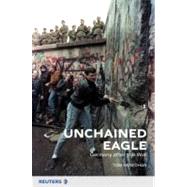| Foreword | xiii | ||||
| Acknowledgements | xv | ||||
|
1 | (12) | |||
|
3 | (1) | |||
|
4 | (3) | |||
|
7 | (6) | |||
| SHEDDING THE POST-WAR CHAINS | |||||
|
13 | (8) | |||
|
14 | (2) | |||
|
16 | (1) | |||
|
17 | (4) | |||
|
21 | (10) | |||
|
23 | (4) | |||
|
27 | (2) | |||
|
29 | (2) | |||
|
31 | (18) | |||
|
32 | (1) | |||
|
33 | (3) | |||
|
36 | (1) | |||
|
37 | (2) | |||
|
39 | (1) | |||
|
39 | (3) | |||
|
42 | (3) | |||
|
45 | (4) | |||
|
49 | (16) | |||
|
50 | (2) | |||
|
52 | (3) | |||
|
55 | (1) | |||
|
56 | (2) | |||
|
58 | (1) | |||
|
59 | (6) | |||
| DISUNITED GERMANY | |||||
|
65 | (14) | |||
|
67 | (2) | |||
|
69 | (2) | |||
|
71 | (1) | |||
|
72 | (3) | |||
|
75 | (4) | |||
|
79 | (10) | |||
|
80 | (1) | |||
|
81 | (2) | |||
|
83 | (1) | |||
|
84 | (3) | |||
|
87 | (2) | |||
|
89 | (15) | |||
|
90 | (3) | |||
|
93 | (3) | |||
|
96 | (4) | |||
|
100 | (4) | |||
|
104 | (14) | |||
|
105 | (2) | |||
|
107 | (1) | |||
|
108 | (2) | |||
|
110 | (1) | |||
|
111 | (1) | |||
|
112 | (2) | |||
|
114 | (1) | |||
|
115 | (3) | |||
|
118 | (13) | |||
|
119 | (2) | |||
|
121 | (1) | |||
|
122 | (5) | |||
|
127 | (4) | |||
|
131 | (12) | |||
|
132 | (2) | |||
|
134 | (4) | |||
|
138 | (2) | |||
|
140 | (3) | |||
|
143 | (11) | |||
|
144 | (1) | |||
|
145 | (3) | |||
|
148 | (2) | |||
|
150 | (1) | |||
|
151 | (3) | |||
|
154 | (13) | |||
|
155 | (1) | |||
|
156 | (2) | |||
|
158 | (2) | |||
|
160 | (1) | |||
|
161 | (1) | |||
|
162 | (5) | |||
| FOUNDING THE BERLIN REPUBLIC | |||||
|
167 | (11) | |||
|
168 | (2) | |||
|
170 | (1) | |||
|
171 | (2) | |||
|
173 | (1) | |||
|
174 | (2) | |||
|
176 | (2) | |||
|
178 | (13) | |||
|
179 | (2) | |||
|
181 | (3) | |||
|
184 | (2) | |||
|
186 | (5) | |||
|
191 | (10) | |||
|
192 | (1) | |||
|
193 | (1) | |||
|
194 | (2) | |||
|
196 | (2) | |||
|
198 | (3) | |||
|
201 | (10) | |||
|
202 | (2) | |||
|
204 | (1) | |||
|
205 | (1) | |||
|
206 | (5) | |||
|
211 | (13) | |||
|
212 | (3) | |||
|
215 | (1) | |||
|
216 | (1) | |||
|
217 | (2) | |||
|
219 | (1) | |||
|
220 | (4) | |||
|
224 | (17) | |||
|
226 | (3) | |||
|
229 | (2) | |||
|
231 | (2) | |||
|
233 | (8) | |||
| Index | 241 |








